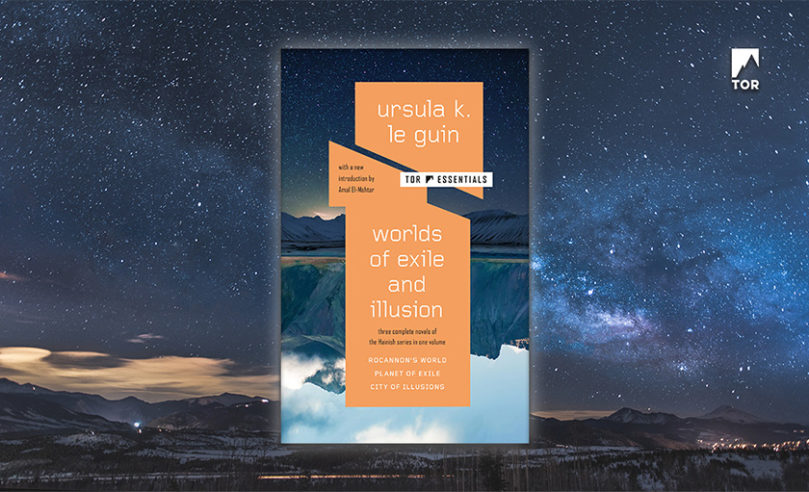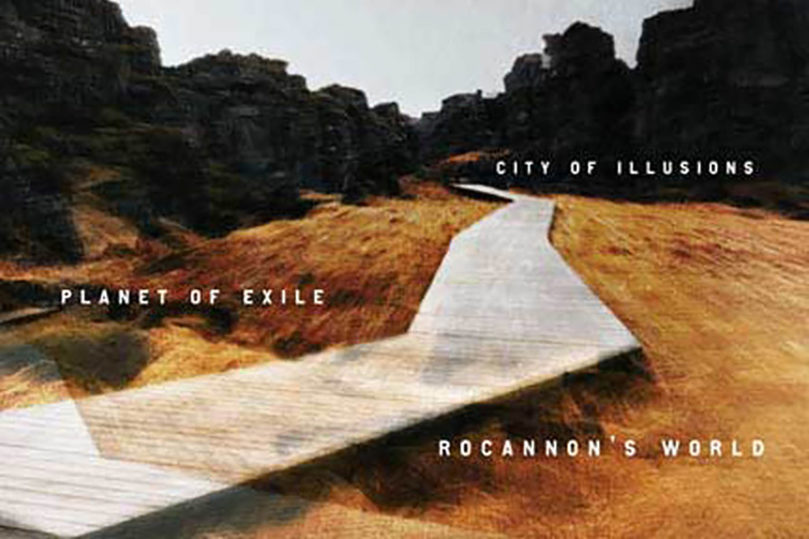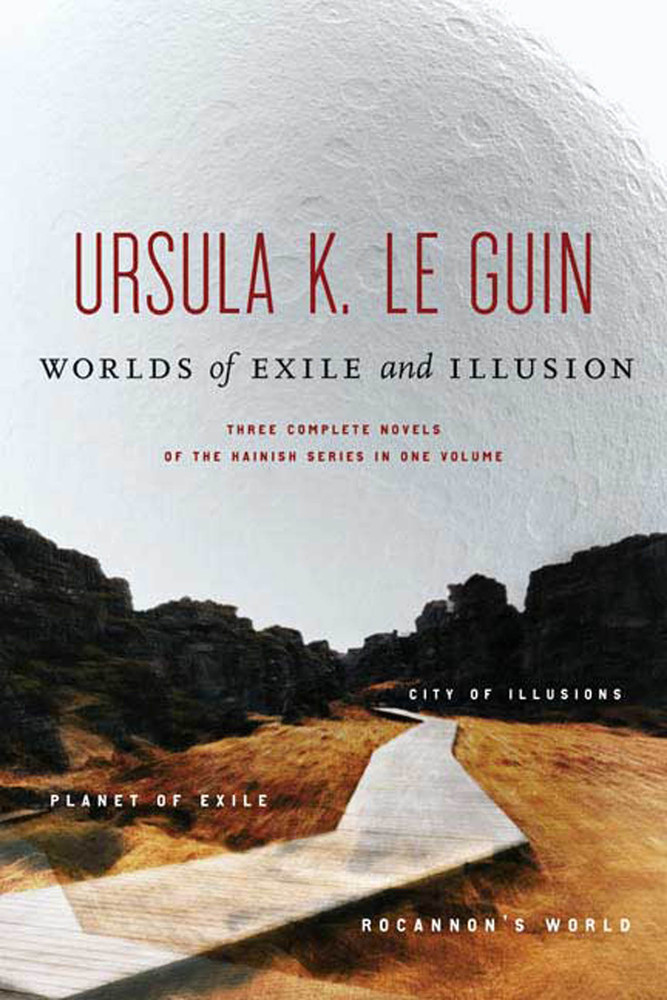opens in a new window opens in a new window
opens in a new window opens in a new window
opens in a new window opens in a new window
opens in a new window opens in a new window
opens in a new window
THREE REMARKABLE JOURNEYS INTO THE STARS.
Worlds of Exile and Illusion by Ursula K. Le Guin includes: Rocannon’s World, Planet of Exile, City of Illusions
These three spacefaring adventures mark the beginning of grand master Ursula K. Le Guin’s remarkable career. Set in the same universe as Le Guin’s groundbreaking classics The Left Hand of Darkness and The Dispossessed, these first three books of the celebrated Hainish Series follow travelers of many worlds and civilizations in the depths of space.
The novels collected in this Tor Essentials edition are the first three ever published by Le Guin, a frequent winner of the Hugo and Nebula Awards and one of the greatest science fiction and fantasy writers of all time.
With a new introduction by Amal El-Mohtar, Hugo and Nebula Award-winning author.
Please enjoy this free excerpt of opens in a new windowWorlds of Exile and Illusion, on sale 3/15/22.
PROLOGUE
The Necklace
How can you tell the legend from the fact on these worlds that lie so many years away?—planets without names, called by their people simply The World, planets without history, where the past is the matter of myth, and a returning explorer finds his own doings of a few years back have become the gestures of a god. Unreason darkens that gap of time bridged by our lightspeed ships, and in the darkness uncertainty and disproportion grow like weeds.
In trying to tell the story of a man, an ordinary League scientist, who went to such a nameless half-known world not many years ago, one feels like an archeologist amid millennial ruins, now struggling through choked tangles of leaf, flower, branch and vine to the sudden bright geometry of a wheel or a polished cornerstone, and now entering some commonplace, sunlit doorway to find inside it the darkness, the impossible flicker of a flame, the glitter of a jewel, the half-glimpsed movement of a woman’s arm.
How can you tell fact from legend, truth from truth?
Through Rocannon’s story the jewel, the blue glitter seen briefly, returns. With it let us begin, here:
Galactic Area 8, No. 62: FOMALHAUT II
High-Intelligence Life Forms: Species Contacted
Species I
A) Gdemiar (singular Gdem): Highly intelligent, fully hominoid nocturnal troglodytes, 120–135 cm. in height, light skin, dark head-hair. When contacted these cave-dwellers possessed a rigidly stratified oligarchic urban society modified by partial colonial telepathy, and a technologically oriented Early Steel culture. Technology enhanced to Industrial, Point C, during League Mission of 252–254. In 254 an Automatic Drive ship (to-from New South Georgia) was presented to oligarchs of the Kiriensea Area community. Status C-Prime.
B) Fiia (singular Fian): Highly intelligent, fully hominoid, diurnal, av. ca. 130 cm. in height, observed individuals generally light in skin and hair. Brief contacts indicated village and nomadic communal societies, partial colonial telepathy, also some indication of short-range TK. The race appears a-technological and evasive, with minimal and fluid culture-patterns. Currently untaxable. Status E-Query.
Species II. Liuar (singular Liu): Highly intelligent, fully hominoid, diurnal, av. height above 170 cm., this species possesses a fortress/village, clan-descent society, a blocked technology (Bronze), and feudal-heroic culture. Note horizontal social cleavage into 2 pseudo-races: (a: Olgyior, “midmen,” light-skinned and dark-haired; (b: Angyar, “lords,” very tall, dark-skinned, yellow-haired—
“That’s her,” said Rocannon, looking up from the Abridged Handy Pocket Guide to Intelligent Life-forms at the very tall, dark-skinned, yellow-haired woman who stood halfway down the long museum hall. She stood still and erect, crowned with bright hair, gazing at something in a display case. Around her fidgeted four uneasy and unattractive dwarves.
“I didn’t know Fomalhaut II had all those people besides the trogs,” said Ketho, the curator.
“I didn’t either. There are even some ‘Unconfirmed’ species listed here, that they never contacted. Sounds like time for a more thorough survey mission to the place. Well, now at least we know what she is.”
“I wish there were some way of knowing who she is. . . .”
She was of an ancient family, a descendant of the first kings of the Angyar, and for all her poverty her hair shone with the pure, steadfast gold of her inheritance. The little people, the Fiia, bowed when she passed them, even when she was a barefoot child running in the fields, the light and fiery comet of her hair brightening the troubled winds of Kirien.
She was still very young when Durhal of Hallan saw her, courted her, and carried her away from the ruined towers and windy halls of her childhood to his own high home. In Hallan on the mountainside there was no comfort either, though splendor endured. The windows were unglassed, the stone floors bare; in coldyear one might wake to see the night’s snow in long, low drifts beneath each window. Durhal’s bride stood with narrow bare feet on the snowy floor, braiding up the fire of her hair and laughing at her young husband in the silver mirror that hung in their room. That mirror, and his mother’s bridal-gown sewn with a thousand tiny crystals, were all his wealth. Some of his lesser kinfolk of Hallan still possessed wardrobes of brocaded clothing, furniture of gilded wood, silver harness for their steeds, armor and silver-mounted swords, jewels and jewelry—and on these last Durhal’s bride looked enviously, glancing back at a gemmed coronet or a golden brooch even when the wearer of the ornament stood aside to let her pass, deferent to her birth and marriage-rank.
Fourth from the High Seat of Hallan Revel sat Durhal and his bride Semley, so close to Hallanlord that the old man often poured wine for Semley with his own hand, and spoke of hunting with his nephew and heir Durhal, looking on the young pair with a grim, unhopeful love. Hope came hard to the Angyar of Hallan and all the Western Lands, since the Starlords had appeared with their houses that leaped about on pillars of fire and their awful weapons that could level hills. They had interfered with all the old ways and wars, and though the sums were small there was terrible shame to the Angyar in having to pay a tax to them, a tribute for the Starlords’ war that was to be fought with some strange enemy, somewhere in the hollow places between the stars, at the end of years. “It will be your war too,” they said, but for a generation now the Angyar had sat in idle shame in their revelhalls, watching their double swords rust, their sons grow up without ever striking a blow in battle, their daughters marry poor men, even midmen, having no dowry of heroic loot to bring a noble husband. Hallanlord’s face was bleak when he watched the fair-haired couple and heard their laughter as they drank bitter wine and joked together in the cold, ruinous, resplendent fortress of their race.
Semley’s own face hardened when she looked down the hall and saw, in seats far below hers, even down among the halfbreeds and the midmen, against white skins and black hair, the gleam and flash of precious stones. She herself had brought nothing in dowry to her husband, not even a silver hairpin. The dress of a thousand crystals she had put away in a chest for the wedding-day of her daughter, if daughter it was to be.
It was, and they called her Haldre, and when the fuzz on her little brown skull grew longer it shone with steadfast gold, the inheritance of the lordly generations, the only gold she would ever possess. . . .
Semley did not speak to her husband of her discontent. For all his gentleness to her, Durhal in his hard lordly pride had only contempt for envy, for vain wishing, and she dreaded his contempt. But she spoke to Durhal’s sister Durossa.
“My family had a great treasure once,” she said. “It was a necklace all of gold, with the blue jewel set in the center—sapphire?”
Durossa shook her head, smiling, not sure of the name either. It was late in warmyear, as these Northern Angyar called the summer of the eighthundred-day year, beginning the cycle of months anew at each equinox; to Semley it seemed an outlandish calendar, a midmannish reckoning. Her family was at an end, but it had been older and purer than the race of any of these northwestern marchlanders, who mixed too freely with the Olgyior. She sat with Durossa in the sunlight on a stone windowseat high up in the Great Tower, where the older woman’s apartment was. Widowed young, childless, Durossa had been given in second marriage to Hallanlord, who was her father’s brother. Since it was a kinmarriage and a second marriage on both sides she had not taken the title of Hallanlady, which Semley would some day bear; but she sat with the old lord in the High Seat and ruled with him his domains. Older than her brother Durhal, she was fond of his young wife, and delighted in the bright-haired baby Haldre.
“It was bought,” Semley went on, “with all the money my forebear Leynen got when he conquered the Southern Fiefs—all the money from a whole kingdom, think of it, for one jewel! Oh, it would outshine anything here in Hallan, surely, even those crystals like koob-eggs your cousin Issar wears. It was so beautiful they gave it a name of its own; they called it the Eye of the Sea. My great-grandmother wore it.”
“You never saw it?” the older woman asked lazily, gazing down at the green mountainslopes where long, long summer sent its hot and restless winds straying among the forests and whirling down white roads to the seacoast far away.
“It was lost before I was born.”
“The Starlords took it for tribute?”
“No, my father said it was stolen before the Starlords ever came to our realm. He wouldn’t talk of it, but there was an old midwoman full of tales who always told me the Fiia would know where it was.”
“Ah, the Fiia I should like to see!” said Durossa. “They’re in so many songs and tales; why do they never come to the Western Lands?”
“Too high, too cold in winter, I think. They like the sunlight of the valleys of the south.”
“Are they like the Clayfolk?”
“Those I’ve never seen; they keep away from us in the south. Aren’t they white like midmen, and misformed? The Fiia are fair; they look like children, only thinner, and wiser. Oh, I wonder if they know where the necklace is, who stole it and where he hid it! Think, Durossa—if I could come into Hallan Revel and sit down by my husband with the wealth of a kingdom round my neck, and outshine the other women as he outshines all men!”
Durossa bent her head above the baby, who sat studying her own brown toes on a fur rug between her mother and aunt. “Semley is foolish,” she murmured to the baby. “Semley who shines like a falling star, Semley whose husband loves no gold but the gold of her hair. . . .”
And Semley, looking out over the green slopes of summer toward the distant sea, was silent.
But when another coldyear had passed, and the Starlords had come again to collect their taxes for the war against the world’s end—this time using a couple of dwarvish Clayfolk as interpreters, and so leaving all the Angyar humiliated to the point of rebellion—and another warmyear too was gone, and Haldre had grown into a lovely, chattering child, Semley brought her one morning to Durossa’s sunlit room in the tower. Semley wore an old cloak of blue, and the hood covered her hair.
“Keep Haldre for me these few days, Durossa,” she said, quick and calm. “I’m going south to Kirien.”
“To see your father?”
“To find my inheritance. Your cousins of Harget Fief have been taunting Durhal. Even that halfbreed Parna can torment him, because Parna’s wife has a satin coverlet for her bed, and a diamond earring, and three gowns, the dough-faced black-haired trollop! while Durhal’s wife must patch her gown—”
“Is Durhal’s pride in his wife, or what she wears?”
But Semley was not to be moved. “The Lords of Hallan are becoming poor men in their own hall. I am going to bring my dowry to my lord, as one of my lineage should.”
“Semley! Does Durhal know you’re going?”
“My return will be a happy one—that much let him know,” said young Semley, breaking for a moment into her joyful laugh; then she bent to kiss her daughter, turned and before Durossa could speak, was gone like a quick wind over the floors of sunlit stone.
Married women of the Angyar never rode for sport, and Semley had not been from Hallan since her marriage; so now, mounting the high saddle of a windsteed, she felt like a girl again, like the wild maiden she had been, riding half-broken steeds on the north wind over the fields of Kirien. The beast that bore her now down from the hills of Hallan was of finer breed, striped coat fitting sleek over hollow, buoyant bones, green eyes slitted against the wind, light and mighty wings sweeping up and down to either side of Semley, revealing and hiding, revealing and hiding the clouds above her and the hills below.
On the third morning she came to Kirien and stood again in the ruined courts. Her father had been drinking all night, and, just as in the old days, the morning sunlight poking through his fallen ceilings annoyed him, and the sight of his daughter only increased his annoyance. “What are you back for?” he growled, his swollen eyes glancing at her and away. The fiery hair of his youth was quenched, gray strands tangled on his skull. “Did the young Halla not marry you, and you’ve come sneaking home?”
“I am Durhal’s wife. I came to get my dowry, father.”
The drunkard growled in disgust; but she laughed at him so gently that he had to look at her again, wincing.
“Is it true, father, that the Fiia stole the necklace Eye of the Sea?”
“How do I know? Old tales. The thing was lost before I was born, I think. I wish I never had been. Ask the Fiia if you want to know. Go to them, go back to your husband. Leave me alone here. There’s no room at Kirien for girls and gold and all the rest of the story. The story’s over here; this is the fallen place, this is the empty hall. The sons of Leynen all are dead, their treasures are all lost. Go on your way, girl.”
Gray and swollen as the web-spinner of ruined houses, he turned and went blundering toward the cellars where he hid from daylight.
Leading the striped windsteed of Hallan, Semley left her old home and walked down the steep hill, past the village of the midmen, who greeted her with sullen respect, on over fields and pastures where the great, wing-clipped, half-wild herilor grazed, to a valley that was green as a painted bowl and full to the brim with sunlight. In the deep of the valley lay the village of the Fiia, and as she descended leading her steed the little, slight people ran up toward her from their huts and gardens, laughing, calling out in faint, thin voices.
“Hail Halla’s bride, Kirienlady, Windborne, Semley the Fair!”
They gave her lovely names and she liked to hear them, minding not at all their laughter, for they laughed at all they said. That was her own way, to speak and laugh. She stood tall in her long blue cloak among their swirling welcome.
“Hail Lightfolk, Sundwellers, Fiia friends of men!”
They took her down into the village and brought her into one of their airy houses, the tiny children chasing along behind. There was no telling the age of a Fian once he was grown; it was hard even to tell one from another and be sure, as they moved about quick as moths around a candle, that she spoke always to the same one. But it seemed that one of them talked with her for a while, as the others fed and petted her steed, and brought water for her to drink, and bowls of fruit from their gardens of little trees. “It was never the Fiia that stole the necklace of the Lords of Kirien!” cried the little man. “What would the Fiia do with gold, Lady? For us there is sunlight in warmyear, and in coldyear the remembrance of sunlight; the yellow fruit, the yellow leaves in end-season, the yellow hair of our lady of Kirien; no other gold.”
“Then it was some midman stole the thing?”
Laughter rang long and faint about her. “How would a midman dare? O Lady of Kirien, how the great jewel was stolen no mortal knows, not man nor midman nor Fian nor any among the Seven Folk. Only dead minds know how it was lost, long ago when Kireley the Proud whose great-granddaughter is Semley walked alone by the caves of the sea. But it may be found perhaps among the Sunhaters.”
“The Clayfolk?”
A louder burst of laughter, nervous.
“Sit with us, Semley, sunhaired, returned to us from the north.” She sat with them to eat, and they were as pleased with her graciousness as she with theirs. But when they heard her repeat that she would go to the Clayfolk to find her inheritance, if it was there, they began not to laugh; and little by little there were fewer of them around her. She was alone at last with perhaps the one she had spoken with before the meal. “Do not go among the Clayfolk, Semley,” he said, and for a moment her heart failed her. The Fian, drawing his hand down slowly over his eyes, had darkened all the air about them. Fruit lay ash-white on the plate; all the bowls of clear water were empty.
“In the mountains of the far land the Fiia and the Gdemiar parted. Long ago we parted,” said the slight, still man of the Fiia. “Longer ago we were one. What we are not, they are. What we are, they are not. Think of the sunlight and the grass and the trees that bear fruit, Semley; think that not all roads that lead down lead up as well.”
“Mine leads neither down nor up, kind host, but only straight on to my inheritance. I will go to it where it is, and return with it.”
The Fian bowed, laughing a little.
Outside the village she mounted her striped windsteed, and, calling farewell in answer to their calling, rose up into the wind of afternoon and flew southwestward toward the caves down by the rocky shores of Kiriensea.
She feared she might have to walk far into those tunnel-caves to find the people she sought, for it was said the Clayfolk never came out of their caves into the light of the sun, and feared even the Greatstar and the moons. It was a long ride; she landed once to let her steed hunt tree-rats while she ate a little bread from her saddle-bag. The bread was hard and dry by now and tasted of leather, yet kept a faint savor of its making, so that for a moment, eating it alone in a glade of the southern forests, she heard the quiet tone of a voice and saw Durhal’s face turned to her in the light of the candles of Hallan. For a while she sat daydreaming of that stern and vivid young face, and of what she would say to him when she came home with a kingdom’s ransom around her neck: “I wanted a gift worthy of my husband, Lord . . .” Then she pressed on, but when she reached the coast the sun had set, with the Greatstar sinking behind it. A mean wind had come up from the west, starting and gusting and veering, and her windsteed was weary fighting it. She let him glide down on the sand. At once he folded his wings and curled his thick, light limbs under him with a thrum of purring. Semley stood holding her cloak close at her throat, stroking the steed’s neck so that he flicked his ears and purred again. The warm fur comforted her hand, but all that met her eyes was gray sky full of smears of cloud, gray sea, dark sand. And then running over the sand a low, dark creature—another—a group of them, squatting and running and stopping.
She called aloud to them. Though they had not seemed to see her, now in a moment they were all around her. They kept a distance from her windsteed; he had stopped purring, and his fur rose a little under Semley’s hand. She took up the reins, glad of his protection but afraid of the nervous ferocity he might display. The strange folk stood silent, staring, their thick bare feet planted in the sand. There was no mistaking them: they were the height of the Fiia and in all else a shadow, a black image of those laughing people. Naked, squat, stiff, with lank black hair and gray-white skins, dampish looking like the skins of grubs; eyes like rocks.
“You are the Clayfolk?”
“Gdemiar are we, people of the Lords of the Realms of Night.” The voice was unexpectedly loud and deep, and rang out pompous through the salt, blowing dusk; but, as with the Fiia, Semley was not sure which one had spoken.
“I greet you, Nightlords. I am Semley of Kirien, Durhal’s wife of Hallan. I come to you seeking my inheritance, the necklace called Eye of the Sea, lost long ago.”
“Why do you seek it here, Angya? Here is only sand and salt and night.”
“Because lost things are known of in deep places,” said Semley, quite ready for a play of wits, “and gold that came from earth has a way of going back to the earth. And sometimes the made, they say, returns to the maker.” This last was a guess; it hit the mark.
“It is true the necklace Eye of the Sea is known to us by name. It was made in our caves long ago, and sold by us to the Angyar. And the blue stone came from the Clayfields of our kin to the east. But these are very old tales, Angya.”
“May I listen to them in the places where they are told?”
The squat people were silent a while, as if in doubt. The gray wind blew by over the sand, darkening as the Greatstar set; the sound of the sea loudened and lessened. The deep voice spoke again: “Yes, lady of the Angyar. You may enter the Deep Halls. Come with us now.” There was a changed note in his voice, wheedling. Semley would not hear it. She followed the Claymen over the sand, leading on a short rein her sharp-taloned steed.
At the cave-mouth, a toothless, yawning mouth from which a stinking warmth sighed out, one of the Claymen said, “The air-beast cannot come in.”
“Yes,” said Semley
“No,” said the squat people.
“Yes, I will not leave him here. He is not mine to leave. He will not harm you, so long as I hold his reins.”
“No,” deep voices repeated; but others broke in, “As you will,” and after a moment of hesitation they went on. The cave-mouth seemed to snap shut behind them, so dark was it under the stone. They went in single file, Semley last.
The darkness of the tunnel lightened, and they came under a ball of weak white fire hanging from the roof. Farther on was another, and another; between them long black worms hung in festoons from the rock. As they went on these fire-globes were set closer, so that all the tunnel was lit with a bright, cold light.
Semley’s guides stopped at a parting of three tunnels, all blocked by doors that looked to be of iron. “We shall wait, Angya,” they said, and eight of them stayed with her, while three others unlocked one of the doors and passed through. It fell to behind them with a clash.
Straight and still stood the daughter of the Angyar in the white, blank light of the lamps; her windsteed crouched beside her, flicking the tip of his striped tail, his great folded wings stirring again and again with the checked impulse to fly. In the tunnel behind Semley the eight Claymen squatted on their hams, muttering to one another in their deep voices, in their own tongue.
The central door swung clanging open. “Let the Angya enter the Realm of Night!” cried a new voice, booming and boastful. A Clayman who wore some clothing on his thick gray body stood in the doorway beckoning to her. “Enter and behold the wonders of our lands, the marvels made by hands, the works of the Nightlords!”
Silent, with a tug at her steed’s reins, Semley bowed her head and followed him under the low doorway made for dwarfish folk. Another glaring tunnel stretched ahead, dank walls dazzling in the white light, but, instead of a way to walk upon, its floor carried two bars of polished iron stretching off side as far as she could see. On the bars rested some kind of cart with metal wheels. Obeying her new guide’s gestures, with no hesitation and no trace of wonder on her face, Semley stepped into the cart and made the wind-steed crouch beside her. The Clayman got in and sat down in front of her, moving bars and wheels about. A loud grinding noise arose, and a screaming of metal on metal, and then the walls of the tunnel began to jerk by. Faster and faster the walls slid past, till the fire-globes overhead ran into a blur, and the stale warm air became a foul wind blowing the hood back off her hair.
The cart stopped. Semley followed the guide up basalt steps into a vast anteroom and then a still vaster hall, carved by ancient waters or by the burrowing Clayfolk out of the rock, its darkness that had never known sunlight lit with the uncanny cold brilliance of the globes. In grilles cut in the walls huge blades turned and turned, changing the stale air. The great closed space hummed and boomed with noise, the loud voices of the Clayfolk, the grinding and shrill buzzing and vibration of turning blades and wheels, the echoes and re-echoes of all this from the rock. Here all the stumpy figures of the Claymen were clothed in garments imitating those of the Starlords— divided trousers, soft boots, and hooded tunics—though the few women to be seen, hurrying servile dwarves, were naked. Of the males many were soldiers, bearing at their sides weapons shaped like the terrible light-throwers of the Starlords, though even Semley could see these were merely shaped iron clubs. What she saw, she saw without looking. She followed where she was led, turning her head neither to left nor right. When she came before a group of Claymen who wore iron circlets on their black hair her guide halted, bowed, boomed out, “The High Lords of the Gdemiar!”
There were seven of them, and all looked up at her with such arrogance on their lumpy gray faces that she wanted to laugh.
“I come among you seeking the lost treasure of my family, O Lords of the Dark Realm,” she said gravely to them. “I seek Leynen’s prize, the Eye of the Sea.” Her voice was faint in the racket of the huge vault.
“So said our messengers, Lady Semley.” This time she could pick out the one who spoke, one even shorter than the others, hardly reaching Semley’s breast, with a white, powerful, fierce face. “We do not have this thing you seek.”
“Once you had it, it is said.”
“Much is said, up there where the sun blinks.”
“And words are borne off by the winds, where there are winds to blow. I do not ask how the necklace was lost to us and returned to you, its makers of old. Those are old tales, old grudges. I only seek to find it now. You do not have it now; but it may be you know where it is.”
“It is not here.”
“Then it is elsewhere.”
“It is where you cannot come to it. Never, unless we help you.”
“Then help me. I ask this as your guest.”
“It is said, The Angyar take; the Fiia give; the Gdemiar give and take. If we do this for you, what will you give us?”
“My thanks, Nightlord.”
She stood tall and bright among them, smiling. They all stared at her with a heavy, grudging wonder, a sullen yearning.
“Listen, Angya, this is a great favor you ask of us. You do not know how great a favor. You cannot understand. You are of a race that will not understand, that cares for nothing but windriding and crop-raising and swordfighting and shouting together. But who made your swords of the right steel? We, the Gdemiar! Your lords come to us here and in Clayfields and buy their swords and go away, not looking, not understanding. But you are here now, you will look, you can see a few of our endless marvels, the lights that burn forever, the car that pulls itself, the machines that make our clothes and cook our food and sweeten our air and serve us in all things. Know that all these things are beyond your understanding. And know this: we, the Gdemiar, are the friends of those you call the Starlords! We came with them to Hallan, to Reohan, to Hul-Orren, to all your castles, to help them speak to you. The lords to whom you, the proud Angyar, pay tribute, are our friends. They do us favors as we do them favors! Now, what do your thanks mean to us?”
“That is your question to answer,” said Semley, “not mine. I have asked my question. Answer it, Lord.”
For a while the seven conferred together, by word and silence. They would glance at her and look away, and mutter and be still. A crowd grew around them, drawn slowly and silently, one after another till Semley was encircled by hundreds of the matted black heads, and all the great booming cavern floor was covered with people, except a little space directly around her. Her windsteed was quivering with fear and irritation too long controlled, and his eyes had gone very wide and pale, like the eyes of a steed forced to fly at night. She stroked the warm fur of his head, whispering, “Quietly now, brave one, bright one, windlord. . . .”
“Angya, we will take you to the place where the treasure lies.” The Clayman with the white face and iron crown had turned to her once more. “More than that we cannot do. You must come with us to claim the necklace where it lies, from those who keep it. The air-beast cannot come with you. You must come alone.”
“How far a journey, Lord?”
His lips drew back and back. “A very far journey, Lady. Yet it will last only one long night.”
“I thank you for your courtesy. Will my steed be well cared for this night? No ill must come to him.”
“He will sleep till you return. A greater windsteed you will have ridden, when you see that beast again! Will you not ask where we take you?”
“Can we go soon on this journey? I would not stay long away from my home.”
“Yes. Soon.” Again the gray lips widened as he stared up into her face.
What was done in those next hours Semley could not have retold; it was all haste, jumble, noise, strangeness. While she held her steed’s head a Clayman stuck a long needle into the golden-striped haunch. She nearly cried out at the sight, but her steed merely twitched and then, purring, fell asleep. He was carried off by a group of Clayfolk who clearly had to summon up their courage to touch his warm fur. Later on she had to see a needle driven into her own arm—perhaps to test her courage, she thought, for it did not seem to make her sleep; though she was not quite sure. There were times she had to travel in the rail-carts, passing iron doors and vaulted caverns by the hundred and hundred; once the rail-cart ran through a cavern that stretched off on either hand measureless into the dark, and all that darkness was full of great flocks of herilor. She could hear their cooing, husky calls, and glimpse the flocks in the front-lights of the cart; then she saw some more clearly in the white light, and saw that they were all wingless, and all blind. At that she shut her eyes. But there were more tunnels to go through, and always more caverns, more gray lumpy bodies and fierce faces and booming boasting voices, until at last they led her suddenly out into the open air. It was full night; she raised her eyes joyfully to the stars and the single moon shining, little Heliki brightening in the west. But the Clayfolk were all about her still, making her climb now into some new kind of cart or cave, she did not know which. It was small, full of little blinking lights like rushlights, very narrow and shining after the great dank caverns and the starlit night. Now another needle was stuck in her, and they told her she would have to be tied down in a sort of flat chair, tied down head and hand and foot.
“I will not,” said Semley.
But when she saw that the four Claymen who were to be her guides let themselves be tied down first, she submitted. The others left. There was a roaring sound, and a long silence; a great weight that could not be seen pressed upon her. Then there was no weight; no sound; nothing at all.
“Am I dead?” asked Semley.
“Oh no, Lady,” said a voice she did not like.
Opening her eyes, she saw the white face bent over her, the wide lips pulled back, the eyes like little stones. Her bonds had fallen away from her, and she leaped up. She was weightless, bodiless; she felt herself only a gust of terror on the wind.
“We will not hurt you,” said the sullen voice or voices. “Only let us touch you, Lady. We would like to touch your hair. Let us touch your hair. . . .”
The round cart they were in trembled a little. Outside its one window lay blank night, or was it mist, or nothing at all? One long night, they had said. Very long. She sat motionless and endured the touch of their heavy gray hands on her hair. Later they would touch her hands and feet and arms, and one her throat: at that she set her teeth and stood up, and they drew back.
“We have not hurt you, Lady,” they said. She shook her head.
When they bade her, she lay down again in the chair that bound her down; and when light flashed golden, at the window, she would have wept at the sight, but fainted first.
“Well,” said Rocannon, “now at least we know what she is.”
“I wish there were some way of knowing who she is,” the curator mumbled. “She wants something we’ve got here in the Museum, is that what the trogs say?”
“Now, don’t call ’em trogs,” Rocannon said conscientiously; as a hilfer, an ethnologist of the High-Intelligence Life Forms, he was supposed to resist such words. “They’re not pretty, but they’re Status C Allies . . . I wonder why the Commission picked them to develop? Before even contacting all the HILF species? I’ll bet the survey was from Centaurus—Centaurans always like nocturnals and cave-dwellers. I’d have backed Species II, here, I think.”
“The troglodytes seem to be rather in awe of her.”
“Aren’t you?”
Ketho glanced at the tall woman again, then reddened and laughed. “Well, in a way. I never saw such a beautiful alien type in eighteen years here on New South Georgia. I never saw such a beautiful woman anywhere, in fact. She looks like a goddess.” The red now reached the top of his bald head, for Ketho was a shy curator, not given to hyperbole. But Rocannon nodded soberly, agreeing.
“I wish we could talk to her without those tr—Gdemiar as interpreters. But there’s no help for it.” Rocannon went toward their visitor, and when she turned her splendid face to him he bowed down very deeply, going right down to the floor on one knee, his head bowed and his eyes shut. This was what he called his All-purpose Intercultural Curtsey, and he performed if with some grace. When he came erect again the beautiful woman smiled and spoke.
“She say, Hail, Lord of Stars,” growled one of her squat escorts in PidginGalactic.
“Hail, Lady of the Angyar,” Rocannon replied. “In what way can we of the Museum serve the lady?”
Across the troglodytes’ growling her voice ran like a brief silver wind.
“She say, Please give her necklace which treasure her blood-kin-forebears long long.”
“Which necklace?” he asked, and understanding him, she pointed to the central display of the case before them, a magnificent thing, a chain of yellow gold, massive but very delicate in workmanship, set with one big hot-blue sapphire. Rocannon’s eyebrows went up, and Ketho at his shoulder murmured, “She’s got good taste. That’s the Fomalhaut Necklace—famous bit of work.”
She smiled at the two men, and again spoke to them over the heads of the troglodytes.
“She say, O Starlords, Elder and Younger Dwellers in House of Treasures, this treasure her one. Long long time. Thank you.”
“How did we get the thing, Ketho?”
“Wait; let me look it up in the catalogue. I’ve got it here. Here. It came from these trogs—trolls—whatever they are: Gdemiar. They have a bargainobsession, it says; we had to let ’em buy the ship they came here on, an AD-4. This was part payment. It’s their own handiwork.”
“And I’ll bet they can’t do this kind of work anymore, since they’ve been steered to Industrial.”
“But they seem to feel the thing is hers, not theirs or ours. It must be important, Rocannon, or they wouldn’t have given up this time-span to her errand. Why, the objective lapse between here and Fomalhaut must be considerable!”
“Several years, no doubt,” said the hilfer, who was used to star-jumping. “Not very far. Well, neither the Handbook nor the Guide gives me enough data to base a decent guess on. These species obviously haven’t been properly studied at all. The little fellows may be showing her simple courtesy. Or an interspecies war may depend on this damn sapphire. Perhaps her desire rules them, because they consider themselves totally inferior to her. Or despite appearances she may be their prisoner, their decoy. How can we tell? . . . Can you give the thing away, Ketho?”
“Oh yes. All the Exotica are technically on loan, not our property, since these claims come up now and then. We seldom argue. Peace above all, until the War comes. . . .”
“Then I’d say give it to her.”
Ketho smiled. “It’s a privilege,” he said. Unlocking the case, he lifted out the great golden chain; then, in his shyness, he held it out to Rocannon, saying, “You give it to her.”
So the blue jewel first lay, for a moment, in Rocannon’s hand.
His mind was not on it; he turned straight to the beautiful, alien woman, with his handful of blue fire and gold. She did not raise her hands to take it, but bent her head, and he slipped the necklace over her hair. It lay like a burning fuse along her golden-brown throat. She looked up from it with such pride, delight, and gratitude in her face that Rocannon stood wordless, and the little curator murmured hurriedly in his own language, “You’re welcome, you’re very welcome.” She bowed her golden head to him and to Rocannon. Then, turning, she nodded to her squat guards—or captors?—and, drawing her worn blue cloak about her, paced down the long hall and was gone. Ketho and Rocannon stood looking after her.
“What I feel . . .” Rocannon began.
“Well?” Ketho inquired hoarsely, after a long pause.
“What I feel sometimes is that I . . . meeting these people from worlds we know so little of, you know, sometimes . . . that I have as it were blundered through the corner of a legend, of a tragic myth, maybe, which I do not understand. . . .”
“Yes,” said the curator, clearing his throat. “I wonder . . . I wonder what her name is.”
Semley the Fair, Semley the Golden, Semley of the Necklace. The Clayfolk had bent to her will, and so had even the Starlords in that terrible place where the Clayfolk had taken her, the city at the end of the night. They had bowed to her, and given her gladly her treasure from amongst their own.
But she could not yet shake off the feeling of those caverns about her where rock lowered overhead, where you could not tell who spoke or what they did, where voices boomed and gray hands reached out—Enough of that. She had paid for the necklace; very well. Now it was hers. The price was paid, the past was the past.
Her windsteed had crept out of some kind of box, with his eyes filmy and his fur rimed with ice, and at first when they had left the caves of the Gdemiar he would not fly. Now he seemed all right again, riding a smooth south wind through the bright sky toward Hallan. “Go quick, go quick,” she told him, beginning to laugh as the wind cleared away her mind’s darkness. “I want to see Durhal soon, soon. . . .”
And swiftly they flew, coming to Hallan by dusk of the second day. Now the caves of the Clayfolk seemed no more than last year’s nightmare, as the steed swooped with her up the thousand steps of Hallan and across the Chasmbridge where the forests fell away for a thousand feet. In the gold light of evening in the flightcourt she dismounted and walked up the last steps between the stiff carven figures of heroes and the two gatewards, who bowed to her, staring at the beautiful, fiery thing around her neck.
In the Forehall she stopped a passing girl, a very pretty girl, by her looks one of Durhal’s close kin, though Semley could not call to mind her name. “Do you know me, maiden? I am Semley Durhal’s wife. Will you go tell the Lady Durossa that I have come back?”
For she was afraid to go on in and perhaps face Durhal at once, alone; she wanted Durossa’s support.
The girl was gazing at her, her face very strange. But she murmured, “Yes, Lady,” and darted off toward the Tower.
Semley stood waiting in the gilt, ruinous hall. No one came by; were they all at table in the Revelhall? The silence was uneasy. After a minute Semley started toward the stairs to the Tower. But an old woman was coming to her across the stone floor, holding her arms out, weeping.
“Oh Semley, Semley!”
She had never seen the gray-haired woman, and shrank back.
“But Lady, who are you?”
“I am Durossa, Semley.”
She was quiet and still, all the time that Durossa embraced her and wept, and asked if it were true the Clayfolk had captured her and kept her under a spell all these long years, or had it been the Fiia with their strange arts? Then, drawing back a little, Durossa ceased to weep.
“You’re still young, Semley. Young as the day you left here. And you wear round your neck the necklace. . . .”
“I have brought my gift to my husband Durhal. Where is he?”
“Durhal is dead.”
Semley stood unmoving.
“Your husband, my brother, Durhal Hallanlord was killed seven years ago in battle. Nine years you had been gone. The Starlords came no more. We fell to warring with the Eastern Halls, with the Angyar of Log and Hul-Orren. Durhal, fighting, was killed by a midman’s spear, for he had little armor for his body, and none at all for his spirit. He lies buried in the fields above Orren Marsh.”
Semley turned away. “I will go to him, then,” she said, putting her hand on the gold chain that weighed down her neck. “I will give him my gift.”
“Wait, Semley! Durhal’s daughter, your daughter, see her now, Haldre the Beautiful!”
It was the girl she had first spoken to and sent to Durossa, a girl of nineteen or so, with eyes like Durhal’s eyes, dark blue. She stood beside Durossa, gazing with those steady eyes at this woman Semley who was her mother and was her own age. Their age was the same, and their gold hair, and their beauty. Only Semley was a little taller, and wore the blue stone on her breast.
“Take it, take it. It was for Durhal and Haldre that I brought it from the end of the long night!” Semley cried this aloud, twisting and bowing her head to get the heavy chain off, dropping the necklace so it fell on the stones with a cold, liquid clash. “O take it, Haldre!” she cried again, and then, weeping aloud, turned and ran from Hallan, over the bridge and down the long, broad steps, and, darting off eastward into the forest of the mountainside like some wild thing escaping, was gone.
Copyright © 2022 by Ursula K. Le Guin
Pre-order Worlds of Exile and Illusion Here:
opens in a new window opens in a new window
opens in a new window opens in a new window
opens in a new window opens in a new window
opens in a new window opens in a new window
opens in a new window
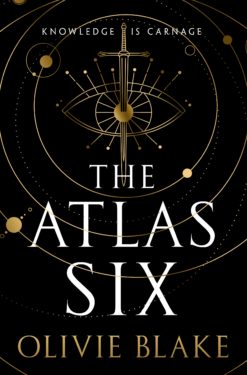 The Atlas Six by Olivie Blake
The Atlas Six by Olivie Blake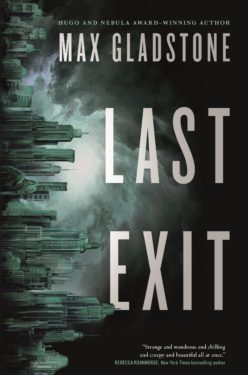 Last Exit by Max Gladstone
Last Exit by Max Gladstone The Kaiju Preservation Society by John Scalzi
The Kaiju Preservation Society by John Scalzi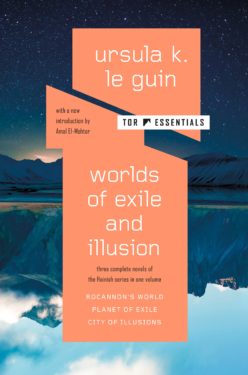 Worlds of Exile and Illusion by Ursula K. Le Guin, introduction by Amal El-Mohtar
Worlds of Exile and Illusion by Ursula K. Le Guin, introduction by Amal El-Mohtar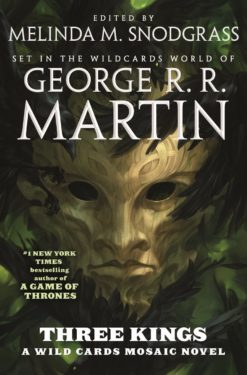 Three Kings edited by Melinda M. Snodgrass, in the Wildcards World of George R.R. Martin
Three Kings edited by Melinda M. Snodgrass, in the Wildcards World of George R.R. Martin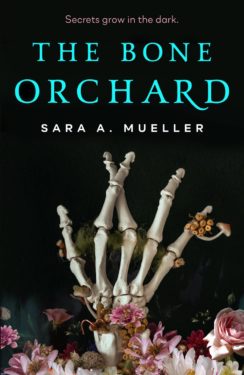 The Bone Orchard by Sara A. Mueller
The Bone Orchard by Sara A. Mueller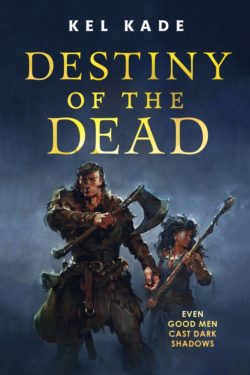 Destiny of the Dead by Kel Kade
Destiny of the Dead by Kel Kade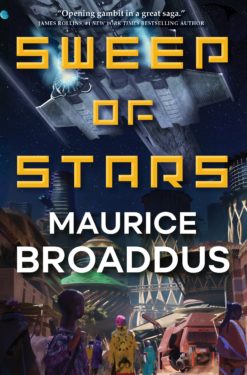 Sweep of Stars by Maurice Broaddus
Sweep of Stars by Maurice Broaddus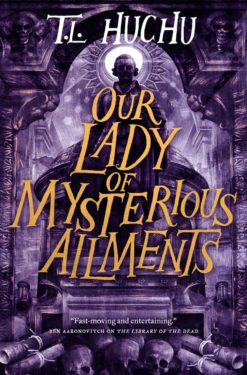 Our Lady of Mysterious Ailments by T.L. Huchu
Our Lady of Mysterious Ailments by T.L. Huchu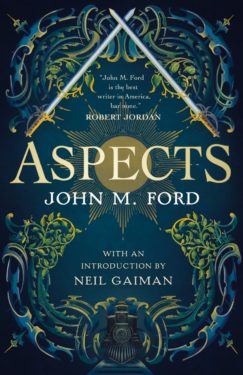 Aspects by John M. Ford
Aspects by John M. Ford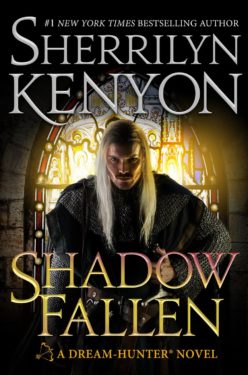 Shadow Fallen by Sherrilyn Kenyon
Shadow Fallen by Sherrilyn Kenyon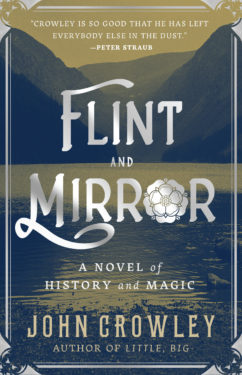 Flint and Mirror by John Crowley
Flint and Mirror by John Crowley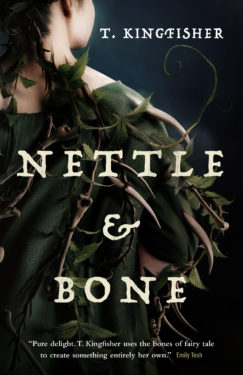 Nettle & Bone by T. Kingfisher
Nettle & Bone by T. Kingfisher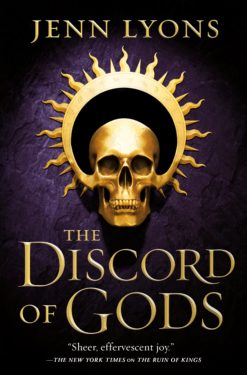 The Discord of Gods by Jenn Lyons
The Discord of Gods by Jenn Lyons Up Against It by Laura J. Mixon
Up Against It by Laura J. Mixon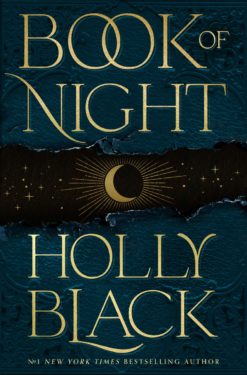 Book of Night by Holly Black
Book of Night by Holly Black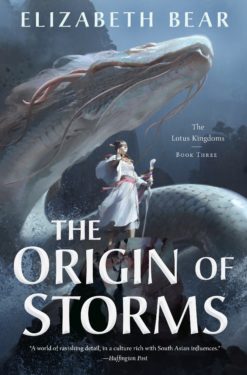 Origin of Storms by Elizabeth Bear
Origin of Storms by Elizabeth Bear
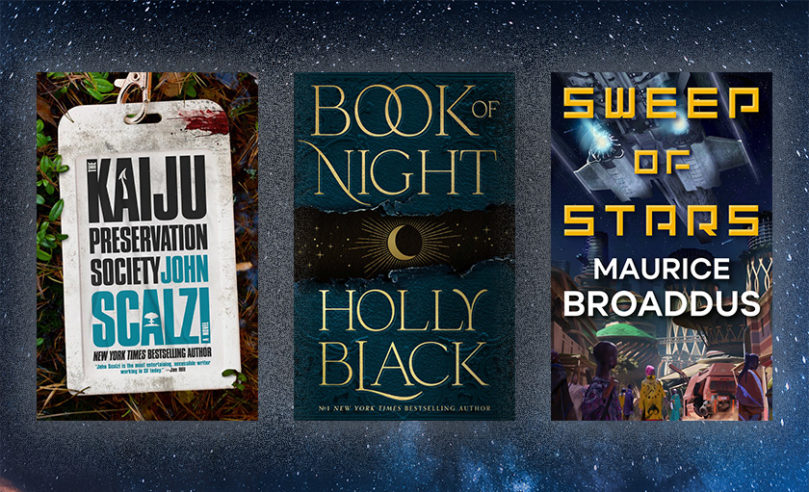
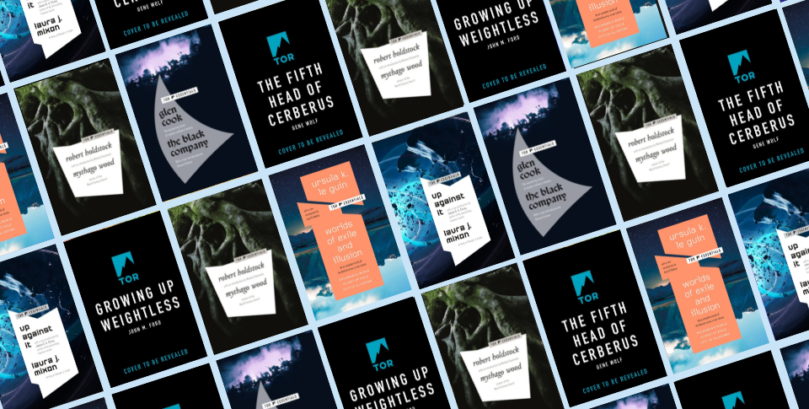
 The Black Company
The Black Company Up Against It
Up Against It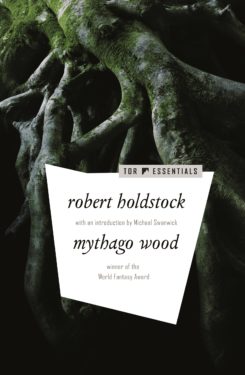 Mythago Wood
Mythago Wood Growing Up Weightless
Growing Up Weightless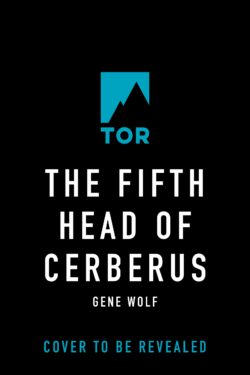 The Fifth Head of Cerberus
The Fifth Head of Cerberus